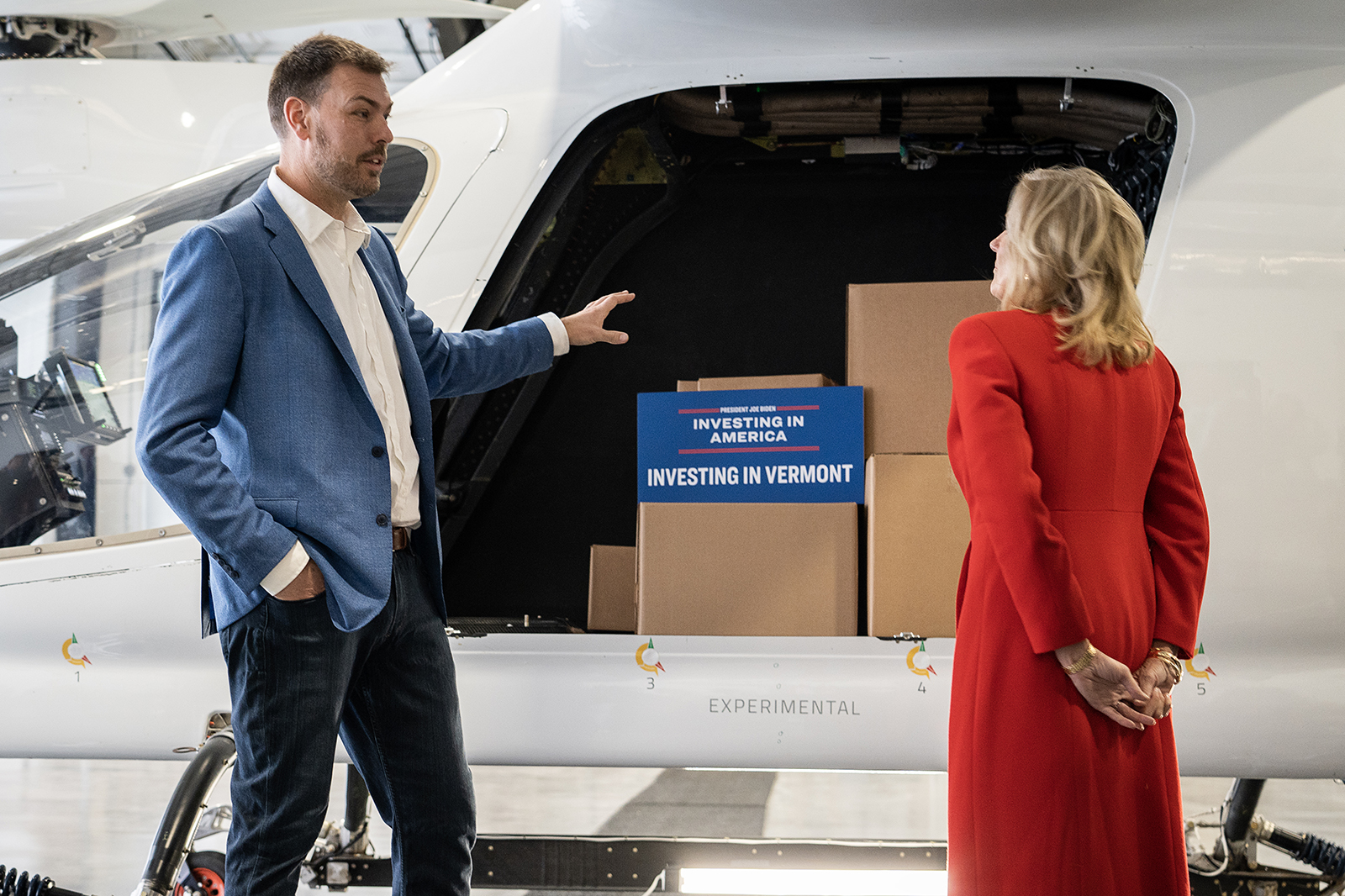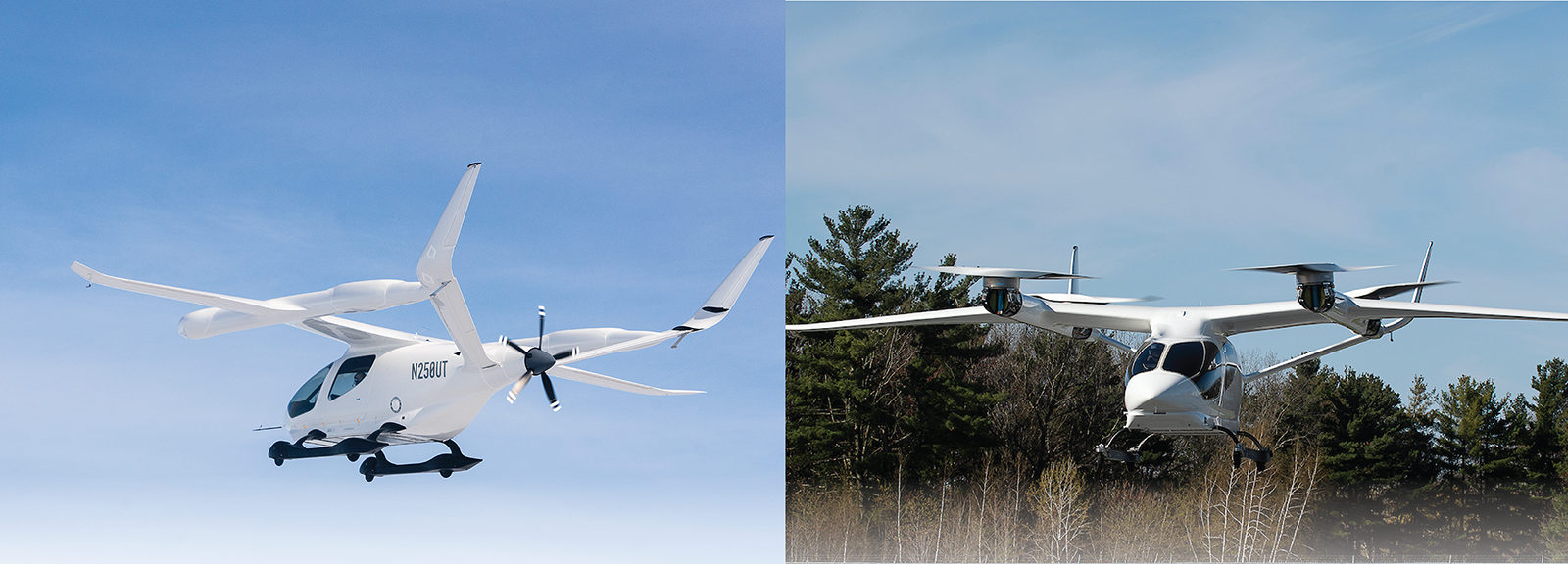Stay Up to Date
Submit your email address to receive the latest industry and Aerospace America news.
Beta Technologies CEO explains the company’s step-by step strategy toward cargo, passenger flights
This story has been updated to reflect U.S. First Lady Jill Biden’s visit to Beta Technologies.
Beta Technologies is confident enough about its customer base and FAA certification of its electric conventional takeoff and landing plane, the CX300, that it plans to move into its planned South Burlington, Vermont, production facility by June, with an anticipated production start in August for CX300s and also the company’s vertical lift Alia aircraft.
“The transition our company has made over the last year is moving from a research and development company to a production company,” Beta founder and CEO Kyle Clark tells me. “The majority of the work being done here is centered on production certification, quality control systems, supply chain and assembling machinery.”
U.S. First Lady Jill Biden and Education Secretary Miguel Cardona visited Beta’s facility on Wednesday afternoon. According to the White House, the visit was to “highlight federal and state investments in high school Career and Technical Education programs related to electric vehicles.” Beta says hundreds of people will work in the facility, which is designed to produce up to 300 aircraft a year.
- RELATED: Volocopter opens production facilities in Germany
Beta is a privately owned company competing in a field of mainly publicly traded or corporation-owned companies. Clark says such private ownership means he doesn’t necessarily update the public on every step of the company’s progress.
“We are not a public company looking to position our stock for the next set of bad news or whatever,” he says. “We do not overrepresent our technological progress or our sales.”
The company has a “ton of MOUs” [memoranda of understanding] that express an intent to buy aircraft, but Beta only announces committed orders backed by a cash deposit.
Beta announced on March 14 that it would certify the CX300 by 2025, leapfrogging its plan to certify the Alia, an electric vertical takeoff and landing (eVTOL) design, by that year. Beta now hopes to certify the Alia by 2026.
The company believes FAA will set a relatively quick path toward certifying the CX300 since it can be treated as a conventional airplane, whereas the Alia design falls under FAA’s still-emerging process to certify eVTOLs and their operations. Beta also intends to certify its electric motor so that it can be sold separately.
Beta said in mid-March that Air New Zealand has ordered three CX300s, with an option for 20 more, while Bristow, the Houston-based helicopter operator, has placed a deposit-backed order for up to 50, in addition to an earlier order for five Alias announced in August, with an option for up to 55 more. Medical delivery company United Therapeutic has ordered an unspecified number of CX300s.
Beta plans to focus first on cargo transport and add passengers for air taxi transport later. Eventually, the company plans to make largely autonomous aircraft with no pilot on board, Clark says.
“You could take it to the extreme and say, ‘I’m going to do a passenger autonomous VTOL aircraft in step one.’ That’s a very valid way to think about the problem, but that is a decadelong endeavor, at least,” Clark says. “We chunked it down to say, ‘Let’s certify the propeller and the motor first, then let’s certify the CTOL aircraft. Then let’s certify the VTOL aircraft. Then let’s extend it to passenger service. Then let’s add autonomy.’ So we will have customers early in that process who want to buy the CTOL.”
The company has test flown some prototypes without pilots on board, but most of its test flight program has been with a pilot in the cockpit.
Clark recalls a moment last summer when cargo company executives were with him in a chase plane watching the eCTOL test plane fly in front of them. The company had not intended to sell the eCTOL at that time and was only testing components for eventual use in the eVTOL.
“But they said, ‘We want that (the eCTOL). If we can get that sooner, we want it,’” he says.
“There’s this idea that the world needs VTOL urban air mobility aircraft, and it does. But taking the fuel out of an aircraft is a meaningful step,” Clark says. “It’s a meaningful enough step that our business model notionally closes without doing anything after that.”
Get the latest news about advanced air mobility delivered to your inbox every two weeks.
About paul brinkmann
Paul covers advanced air mobility, space launches and more for our website and the quarterly magazine. Paul joined us in 2022 and is based near Kennedy Space Center in Florida. He previously covered aerospace for United Press International and the Orlando Sentinel.
Related Posts
Stay Up to Date
Submit your email address to receive the latest industry and Aerospace America news.





